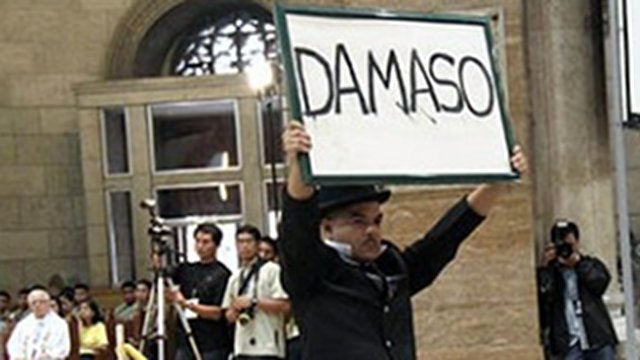SUMMARY
This is AI generated summarization, which may have errors. For context, always refer to the full article.

MANILA, Philippines – The guilty charge slapped on advocate Carlos Celdran for “offending religious feelings” could test the 1987 Constitution, which guarantees free speech, said his lawyer.
“If this will not be reversed by the higher courts we are taking steps backwards and going back to the times when our fundamental liberties were not guaranteed by the Constitution,” said Celdran’s lawyer Marlon Manuel in a phone interview with Rappler on Monday, January 28.
The decision carries with it a prison term of not less than two months and 21 days and not more than one year, one month and 11 days.
Celdran was charged in 2010 after he interrupted a service at the Manila Cathedral by holding up a placard with the word “Damaso” on it, in reference to the villainous priest in Jose Rizal’s famous novel “Noli Me Tangere.”
Manuel said Celdran will be appealing the guilty verdict based on the merits of the case and constitutional grounds. He added they have yet to decide if they will lodge an appeal with the regional trial court or go all the way up to the Supreme Court. Either way, Manuel said, they will raise the issue of free speech.
Manuel added that based on his research, other cases where a Filipino was found guilty of offending religious sentiments were tried in the 1930s. Celdran’s “may be the first post World War II case and certainly the first under the 1987 Constitution,” he said.
The issue has become “bigger than me. It’s become about people being able to question authorities,” said Celdran in an interview with ANC.
‘Outdated and obsolete’
Celdran was convicted under a seldom-used article of the Revised Penal Code, which was enacted back in 1930 and went into effect in 1932.
Under Section 4, Article 133 on crimes against religious worship, jail time can be imposed “upon anyone who, in a place devoted to religious worship or during the celebration of any religious ceremony shall perform acts notoriously offensive to the feelings of the faithful.”
Celdran’s lawyer said the article is “outdated and obsolete. It has no place in our society now.”
Since the penal code was put in place more than 80 years ago, the Philippines has changed constitutions 5 times – in 1935, 1943, 1973, 1986 and 1987. The current 1987 Constitution states that “no law shall be passed abridging the freedom of speech, of expression, or of the press.”
“This is the only case of this nature under the 1987 constitution so it’s a big setback if you are talking about the freedoms guaranteed under the Constitution,” said Manuel.
“It’s like we’re [experiencing] time travel and traveling back to medieval times when the church leaders would try to execute heretics,” he said.
As of publishing, Rappler’s faxed request for a sitdown interview with Monsignor Nestor Cerbo, the rector at Manila Cathedral who filed the case, and his lawyer Ronaldo Reyes, had not been granted. Speaking to Rappler over the phone Cerbo said, “I have not seen the decision yet, so I can not make a comment yet.”
Merits of the case
The guilty verdict, issued Dec 14, 2012 and handed down on January 28, caught Celdran and his lawyer by surprise. “We were not expecting it,” said Manuel.
“Our position is that there should not have been any conviction, even assuming that we will honor the law as constitutional,” he said.
He said that the past convictions required “particularly offensive action directed at religious dogma.” And he maintained that Celdran’s protest was not offensive enough to merit the charge.
“For Catholics if you have desecrated a holy object, that is offensive to the religious feelings of any Catholic. If you desecrate a Koran, that will offend the religious feelings of Muslims. The word Damaso does not amount to that,” he said.
He also pointed out that the handful of witnesses who testified for the prosecution had organized the event at the church on Sept 30, 2010. “Of course they were offended. They were the organizers and the program that they organized was disturbed,” said Manuel, who questioned why the Monsignor who filed the case never testified.
For his part, Celdran told media today, “I still stand by my stand that I did not offend religious feelings.”
Jail time a long way away
Celdran’s lawyer said the Church critic and prominent tour guide will not be in jail any time soon.
“We made a manifestation earlier asking that he be allowed to be on provisional liberty. That’s quite ordinary especially for minor cases. So there is no impending detention. We’re worried about that,” he said.
For now Celdran, who is famous for his theatrical guided tours where he makes Philippine history jump to life, told media “It’s business as usual.” But still he said when he leads his tours by San Agustin Church the guards do wave him away. He doesn’t go into Manila Cathedral since it is under renovation.
Manuel said they remained hopeful Celdran will eventually be declared innocent. – Rappler.com
Related story:
Add a comment
How does this make you feel?
There are no comments yet. Add your comment to start the conversation.